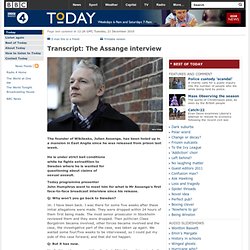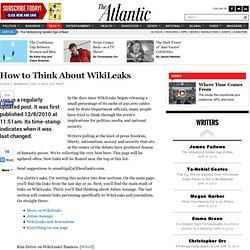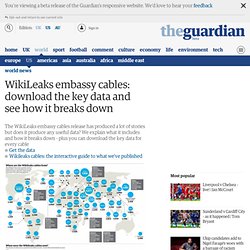

Transcript: The Assange interview. The founder of Wikileaks, Julian Assange, has been holed up in a mansion in East Anglia since he was released from prison last week.

He is under strict bail conditions while he fights extradition to Sweden where he is wanted for questioning about claims of sexual assault. Today programme presenter John Humphrys went to meet him for what is Mr Assange's first face-to-face broadcast interview since his release. Q: Why won't you go back to Sweden? JA: I have been back. I was there for some five weeks after these initial allegations were made. Q: But it has now. JA: It did not happen, and then I asked: "OK, I have things to do, I had only planned to be in Sweden for one week, it's time to leave.
Q: Why can't you go back to Sweden? JA: I don't need to go back to Sweden. Q: You do because the law says you must. JA: Well no, the law says that I also have certain rights. Q: But they don't just want to have a chat, do they? JA: No, they do. Q: That rather belittles what this is all about. Wikileaks Mirror Network. More WikiLeaks: The 24-hour Athenian democracy. How to Think About WikiLeaks - Alexis Madrigal - Technology.
This is a regularly updated post.

It was first published 12/8/2010 at 11:51am. Its time-stamp indicates when it was last changed. In the days since WikiLeaks began releasing a small percentage of its cache of 250,000 cables sent by State Department officials, many people have tried to think through the event's implications for politics, media, and national security. Writers pulling at the knot of press freedom, liberty, nationalism, secrecy and security that sits at the center of the debate have produced dozens of fantastic pieces.
We're collecting the very best here. Send suggestions to amadrigal[at]theatlantic.com. For clarity's sake, I'm sorting this archive into four sections. Kim Zetter on WikiLeaks' finances. WikiLeaks' expenditures have risen dramatically in the last five months, from a paltry $38,000 between October 2009 and July 2010 to more than $495,000 in the last five months, according to a foundation that manages most of the organization's donations. C. A Letter from Anonymous. WikiLeaks embassy cables: download the key data and see how it breaks down.
• Remember this is the date, time, sender and tags for each cable - NOT the text of the cable itself WikiLeaks embassy cables revelations cover a huge dataset of official documents: 251,287 dispatches, from more than 250 worldwide US embassies and consulates.

It's a unique picture of US diplomatic language - including over 50,000 documents covering the current Obama administration. But what does the data include? The cables themselves come via the huge Secret Internet Protocol Router Network, or SIPRNet. SIPRNet is the worldwide US military internet system, kept separate from the ordinary civilian internet and run by the Department of Defense in Washington. An embassy dispatch marked SIPDIS is automatically downloaded on to its embassy classified website. We've broken down the data for you - and you can download the basic details of every cable (without the actual content) below.
What can you do with the data? Download the data World government data Development and aid data.